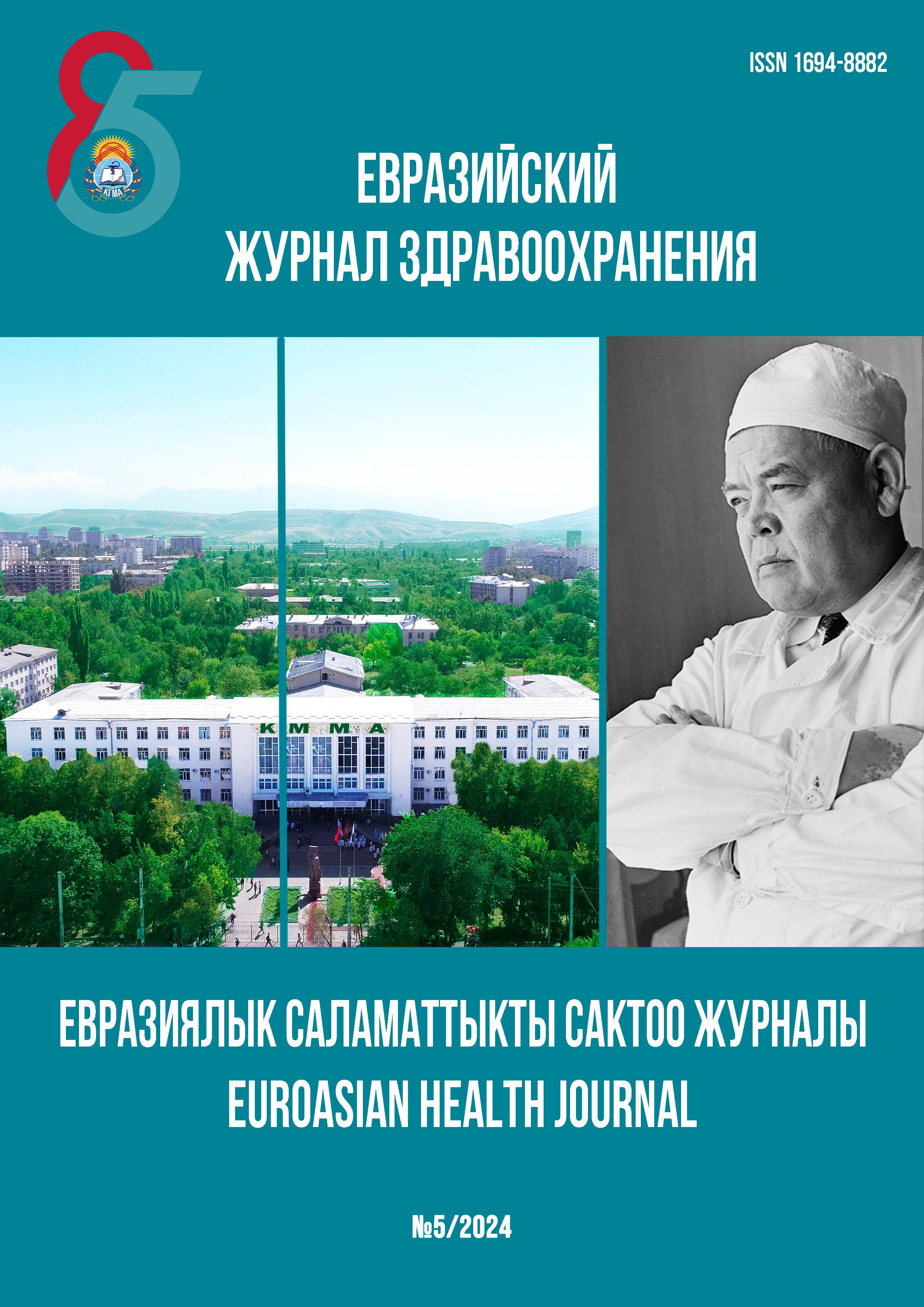CULTURAL AND LINGUISTIC NUANCES OF THE CONCEPT "RESPECT/URMAT-SYI/RESPECT" IN MEDICAL TEXTS: ANALYSIS OF KYRGYZ, RUSSIAN AND ENGLISH EXAMPLES
DOI:
https://doi.org/10.54890/1694-8882-2024-5-190Abstract
This study examines cultural and linguistic nuances of the concept "respect/urmat- syi/respect" in medical texts, comparing examples from Kyrgyz, Russian and English languages. The concept "respect/urmat-syy/respect" plays an important role in doctor-patient communication and affects the quality of medical care. In a multicultural environment where people of different linguistic and cultural backgrounds meet, it becomes increasingly important to understand the subtle differences in the meaning and application of this term. This article analyses how 'respect/urmat-say/respect' is expressed in medical texts and documents in the three languages mentioned and what cultural implications result from this. Through detailed analyses of selected medical texts, differences and similarities will be identified, indicating the cultural values and norms of the respective language communities. This study helps to deepen understanding of the importance of respect in medical communication and highlights the importance of recognising linguistic and cultural differences in medical practice. The findings offer valuable insights for medical practitioners, translators and ethicists working in international and multicultural settings.
Keywords:
respect, urmat-syi, respect, Kyrgyz language, Russian language, English language, cultural differences, intercultural analysis, translation problems, communicative barriersReferences
1. Brown A, Crookes P, Dewing J. Clinical leadership development in a pre-registration nursing curriculum: What the profession has to say about it. Nurse education today. 2016;36:105–111. https://doi.org/10.1016/j.nedt.2015.08.006
2. Papadopoulos R, Tilki M, Lees S. Promoting cultural competence in health care through a research based intervention in the UK. Diversity in Health and Social Care. 2004;1(2):107-115. https://repository.mdx.ac.uk/item/80qx9
3. Jongen C, McCalman J, Bainbridge R. Health workforce cultural competency interventions: a systematic scoping review. BMC health services research. 2018;18 (1):232. https://doi.org/10.1186/s12913-018-3001-5
4. Hall WJ, Chapman MV, Lee KM, Merino YM, Thomas TW, Payne BK, et al. Implicit Racial/Ethnic Bias Among Health Care Professionals and Its Influence on Health Care Outcomes: A Systematic Review. American journal of public health. 2015:105(12):e60–e76. https://doi.org/10.2105/AJPH.2015.302903
5. Beach, M. C., Inui, T., & Relationship-Centered Care Research Network (2006). Relationship-centered care. A constructive reframing. Journal of general internal medicine/ 2006;21(Suppl. 1):S3–S8. https://doi.org/10.1111/j.1525-1497.2006.00302.x
6. Schouten BC, Meeuwesen L. Cultural differences in medical communication: a review of the literature. Patient education and counseling. 2006;64(1-3):21–34. https://doi.org/10.1016/j.pec.2005.11.014
7. Matusitz J, Spear J. Doctor-Patient Communication Styles: A Comparison Between the United States and Three Asian Countries. Journal of Human Behavior in the Social Environment. 2015;25(8):871–884. https://doi.org/10.1080/ 10911359.2015.1035148
8. Kaihlanen AM, Hietapakka L, Heponiemi T. Increasing cultural awareness: qualitative study of nurses’ perceptions about cultural competence training. BMC Nurs. 2019;18:38. https://doi.org/10.1186/s12912-019-0363-x
9. Мусозранова М.Б., Разумов В.И., Нестерова К.И. Генезис речевой компетентности врача [Электронный ресурс]. Современные проблемы науки и образования. 2017;2. Режим доступа: https://www.science-education.ru/ru/article /view?id=26247
10. Зияев Ф.С., Холбеков А.Я. Гуманизм в медицине – это уважение к личности через милосердие и сострадание. Academic research in educational sciences, TSDI and TMA Conference. 2022;1:85-88. https://doi.org/10.24412/2181-1385-2022-85-88
11. Серченко О.Г. Медицинская этика [Электронный ресурс]. Ютека; 2023. Режим доступа: https://uteka.ru/articles/ fakty/meditsinskaya-etika/
12. Матвеева Т.Ф. Этический аспект речевого общения «Врач-пациент» как ключевая тема курса «Культура речи врача». Полилингвиальность и транскультурные практики. 2014;4:118-123.
13. Ахмедова Н.Д. Роль этической культуры в профессиональной деятельности врача. Universum: психология и образование. 2021;6(84):12-14.
14. Утемуратова Д.Ш., Мамбетназарова Т.Т. О медицинской этике и деонтологии. Экономика и социум. 2020;5(72):286-288.
15. Кирова Т.А. О правовом значении медицинской этики. Ex jure. 2018;1:128-139. https://doi.org/10.17072/2619-0648-2018-1-128-139







